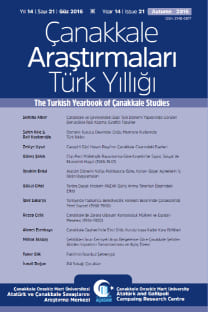The Impact of the Confiscation of the Turkish Dreadnoughts and of the Transfer of Goeben and Breslau to Constantinople upon the Turkish Entry into WWI
İngiliz Kraliyet Donanması’nda dönemin Birinci Deniz Lordu (müsteşarı) olan Winston Churcill, Birinci Dünya Savaşı’ndan önce Osmanlı İmparatorluğu tarafından sipariş edilen ve ödemesi yapılan iki dretnota el koydurmadan önce Goben (Yavuz) ve Breslav (Midilli) meselesinin gelişmesi ve Osmanlı İmparatorluğu’nun savaşa girmesi için gerekli zemini çoktan hazırlamıştı. Bu “korsanlık” (B. Tuchman), Türk Hükümeti içerisinde taşların yerinden oynamasına ve dengenin o ana kadar daha güçlü olan tarafsızlardan uzaklaşarak savaş yanlılarına, Harbiye Nazırı Enver Paşa’ya yönelmesine neden olmuştur. Eğer bu hata gerçekleşmeseydi, Yavuz ve Midilli asla Osmanlı’ya sığınmazdı. Bu iki savaş gemisi, Karadeniz kıyılarında bulunan Rus limanlarını bombaladıkları zaman Osmanlı’nın savaşa girmesinin temel nedeni olmuşlardır
Anahtar Kelimeler:
Birinci Dünya Savaşı, Goben, Breslav, Osmanlı İmparatorluğu, Çanakkale
Türk Dretnotlarına l Konulması ve Goben ile Breslav Gemilerinin İstanbul'a Transfer Edilmesinin Osmanlı Devleti'nin I. Dünya Savaşı'na Girişi Üzerindeki Etkisi
When Winston Churchill then First Sealord of the Royal Navy had the two Dreanoughts, ordered and paid for by the Ottoman Empire before World War I, confiscated he created the preconditions for the Goeben-and Breslau-affair and the entry of Turkey into the war. This “act of piracy” (B. Tuchman) shifted the weight from the so far stronger neutralists to the bellicists with in the Turkish Government towards war minister Enver. Without this mistake Goeben and Breslau would never have sought shelter in Turkey. And these two men of war were the reason for Turkey’s entry into the war when they bombarded Russian harbours in the Black Sea
Keywords:
World War I, Goeben, Breslau, Ottoman Empire, Çanakkale,
___
- Ahmed Djemal Pascha, Erinnerungen eines Türkischen Staatsmannes, München 1922.
- Churchill, Winston, The World Crisis 1911-1918, C. I, London 1938.
- Gilbert, Martin, Winston Churchill, c. II, 1914-1916, London 1971.
- Great Britain Foreign Office, Events Leading up to Rupture of Relations with Turkey, London 1914.
- Halpern, Paul G., The Naval War in the Mediterranean 1914-1918, Oxford 1987.
- Hart, Peter, Gallipoli, London, 2011.
- Kannengießer, Hans, Gallipoli Bedeutung und Verlauf der Kämpfe 1915, 1927 Berlin.
- Langensiepen, Bernd, Dirk Nottelmann, Jochen Krüsman (Eds. Halbmond und Kaiseradler), Goeben und Breslau am Bosporus 1914-1918, Hamburg 1999.
- Lorey, Hermann, Der Krieg in den Türkischen Gewässern, Vol.. 1 Die Mittelmeer-Division, Berlin 1928.
- McLaughlin, Redmond, The Escape of the Goeben. Prelude to Gallipol, London 1974.
- Morgenthau, Henry, Ambassador Morgenthaus Story, New York 1919.
- Mühlmann, Carl, Deutschland und die Türkei, Berlin 1929.
- Palmer, Alan, Verfall und Untergang des Osmanischen Reiches, München 1994.
- Richter, Heinz A., Der Krieg im Südosten, Band 1 Gallipoli 1915, Mainz & Ruhpolding: Rutzen 2014.
- Souchon, Wilhelm, Der Durchbruch SM Schiffe Goeben und Breslau von Messina nach den Dardanellen, (ed. Eberhard von Mantey), Auf See unbesiegt. Erlebnisse im Seekrieg erzählt von Mitkämpfern, München 1922.
- Souchon, Wilhelm, La percée de SMS Goeben et Breslau de Messine aux Dardanelles, in: Les Marins Allemands au Combat, (French edition), Paris 1930.
- Tuchman, Barbara, The Guns of August, New York 1994.
- Van der Vat, Dan, The Ship that Changed the World. The Escape of the Goeben to the Darda- nelles in 1914, Edinburgh 2000.
- ISSN: 2148-0877
- Yayın Aralığı: 2
- Başlangıç: 2003
- Yayıncı: Murat Karataş
